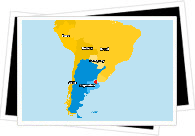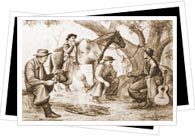
The name Argentina derives from the Latin 'argentum' meaning silver as the Spanish conquerors were given silver gifts by the natives at the Río de la Plata (Silver River).
The second largest country in South America, Argentina spans an area of almost 3.8 million square km and has more than a third of the population living in the capital city, Buenos Aires.
The country is most famous for its beef, which is exported around the world, its international footballer cum manager Diego Maradona, Evita Perón, first lady of Argentina and the sensual dance, the Tango.

Traces of human history in Argentina date back 13,000 years but the main two tribes in Argentina prior to the arrival of the Spanish were the Diaguita to the north and the Guaraní to the east and south. The Diaguita used sophisticated agricultural techniques such as irrigation and are known for their ceramics. They were farmers yet managed to stave off the Inca empire. The Guaraní still exist today in Argentina, Paraguay, southern Brazil, as well as some parts of Uruguay and Bolivia. Independence from Spanish rule came in 1816 and from 1880 onwards the country progressed significantly both economically and socially so that at the beginning of the 20th century Argentina was one of the richest countries in the world.
Unlike other countries in Latin America, Argentina's inhabitants are mostly of European origin. From 1850 for ninety years, some 3.2 million people moved to Argentina from Europe - mostly from Italy and Spain. Being located in the southern hemisphere, the seasons in Argentina are the opposite of those in the northern hemisphere so summer is from December to February. Due to the size of the country and that it stretches 3900km (2400 miles) from north to south, there is no typical weather in Argentina. The north is sub tropical, the south sub arctic and the plains in the east are mild and humid. Average summer temperatures are around 23 degrees Celsius and in winter this drops to 12 degrees.

The Argentine cowboys, called Gauchos, roamed the country from the 1600's for 300 years. Similary to the American cowboys and the Australian Jackaroos they worked independently at ranches for the season. Originally they were gruff characters and the name Gaucho was a derogatory one when it was coined around the year 1800. The Gaucho's reputation transformed with the years and nowadays this historical plainsman is recognized as being an independent, brave warrior, kind and generous to all. According to many Argentines, the Gaucho's character is instilled into each and everyone of them.
Religious freedom prevails in Argentina and the majority of the population is Catholic, although it is also home to the largest Jewish population in Latin America. Argentina's official language is Spanish, however indigenous native languages are common and other European languages can often be heard. Over 10% of the world's known flora can be found within Argentina's borders. The country also has a large number of dinosaur fossils - some of the largest dinosaurs in the world have been found in the Andes.